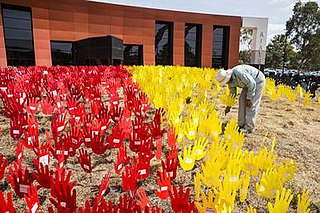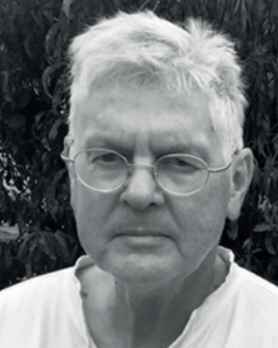Related Research Articles

Man of Aran is a 1934 Irish fictional documentary (ethnofiction) film shot, written and directed by Robert J. Flaherty about life on the Aran Islands off the western coast of Ireland. It portrays characters living in premodern conditions, documenting their daily routines such as fishing off high cliffs, farming potatoes where there is little soil, and hunting for huge basking sharks to get liver oil for lamps. Some situations are fabricated, such as one scene in which the shark fishermen are almost lost at sea in a sudden gale. Additionally, the family members shown are not actually related, having been chosen from among the islanders for their photogenic qualities.

Jedda, released in the UK as Jedda the Uncivilised, is a 1955 Australian film written, produced and directed by Charles Chauvel. His last film, it is notable for being the first to star two Aboriginal actors, Robert Tudawali and Ngarla Kunoth in the leading roles. It was also the first Australian feature film to be shot in colour.

The Aboriginal Tent Embassy is a permanent protest occupation site as a focus for representing the political rights of Aboriginal Australians and Torres Strait Islander people. Established on 26 January 1972, and celebrating its 50th anniversary in 2022, it is the longest continuous protest for Indigenous land rights in the world.

The Australian Institute of Aboriginal and Torres Strait Islander Studies (AIATSIS), established as the Australian Institute of Aboriginal Studies (AIAS) in 1964, is an independent Australian Government statutory authority. It is a collecting, publishing, and research institute and is considered to be Australia's premier resource for information about the cultures and societies of Aboriginal and Torres Strait Islander peoples.

Norman Barnett Tindale AO was an Australian anthropologist, archaeologist, entomologist and ethnologist.

Pittwater is a semi-mature tide dominated drowned valley estuary, located about 40 kilometres (25 mi) north of the Sydney central business district, New South Wales, Australia; being one of the bodies of water that separate greater Metropolitan Sydney from the Central Coast.

Green Island is a marine island and locality in the Cairns Region, Queensland, Australia. In the 2021 census, Green Island had a population of 20 people.
Richard Bell is an Aboriginal Australian artist and political activist. He is one of the founders of proppaNOW, a Brisbane-based Aboriginal art collective.
The National Black Theatre (NBT) was a theatre company run by a small group of Aboriginal people based in the Sydney suburb of Redfern which operated from 1972 to 1977. The original concept for the theatre grew out of political struggles, especially the land rights demonstrations, which at the time were being organised by the Black Moratorium Committee. The centre held workshops in modern dancing, tribal dancing, writing for theatre, karate and photography, and provided a venue for new Aboriginal drama. It also ran drama classes under Brian Syron, whose students included Jack Davis, Freddie Reynolds, Maureen Watson, Lillian Crombie, and Hyllus Maris.

Peter Sutton FASSA is an Australian social anthropologist and linguist who has, since 1969, contributed to: recording Australian Aboriginal languages; promoting Australian Aboriginal art; mapping Australian Aboriginal cultural landscapes; and increasing societies' general understanding of contemporary Australian Aboriginal social structures and systems of land tenure. In 1976 Isobel Wolmby and her husband of the Wik peoples adopted Sutton as their tribal son.
Lester Richard Hiatt, known as Les Hiatt, was a scholar of Australian Aboriginal societies who promoted Australian Aboriginal studies within both the academic world and within the wider public for almost 50 years. He is now regarded as one of Australia's foremost anthropologists.
The trial of Lex Wotton relates to the events surrounding the Townsville, Queensland proceedings in the Federal Magistrates Court concerning the actions taken by Palm Island Aboriginal Shire Council member Wotton during the 26 November 2004 Palm Island riots.
Frontyard Films is an Australian film production company that makes documentary films, owned by Australian documentary filmmakers Amanda King and Fabio Cavadini. Their films include An Evergreen Island, Starting from Zero and A Thousand Different Angles.
Laurie Baymarrwangga (Gawany) Baymarrwaŋa was the senior Aboriginal traditional owner of the Malarra estate, which includes Galiwin'ku, Dalmana, Murruŋga, Brul-brul and the Ganatjirri Maramba salt water surrounding the islands and inclusive of some 300 other named sites. She devoted her life to the intergenerational transmission of the ancestral language and knowledge of her homelands on the Crocodile Islands, for the benefit of future generations.
Journey Out of Darkness is a 1967 Australian film.

Dark Age is a 1987 Australian horror adventure film directed by Arch Nicholson, produced by Antony I. Ginnane and starring John Jarratt, Nikki Coghill, and Max Phipps. In the film, an Australian park ranger is tasked with hunting a legendary, 25-foot crocodile that appears to have a spiritual connection with the local Aboriginals. The film was released on July 10, 1987.

The Tall Man is a 2011 Australian documentary film directed by Tony Krawitz. It is about the death of Cameron "Mulrunji" Doomadgee in police custody on Great Palm Island, Palm Islands, Queensland on 19 November 2004.
The Dyirbal, also called Jirrbal, are an Aboriginal Australian people living in northern Queensland, both one tribe and a group of related contiguous peoples included under that label as the Dyirbal tribes. They live on the upper Murray river of the Atherton Tableland. Their name is used as a generic term to refer specifically to one of eight groups, the others being Yidinji, Ngadyan, Mamu, Girramay, Wargamay, Waruŋu and Mbabaɽam.
The Yan-nhaŋu, also known as the Nango, are an indigenous Australian people of the Northern Territory. They have strong sociocultural connections with their neighbours, the Burarra, on the Australian mainland.

Dark Emu: Black Seeds: Agriculture or Accident? is a 2014 non-fiction book by Bruce Pascoe. It re-examines colonial accounts of Aboriginal people in Australia, and cites evidence of pre-colonial agriculture, engineering and building construction by Aboriginal and Torres Strait Islander peoples. A second edition, published under the title Dark Emu: Aboriginal Australia and the Birth of Agriculture was published in mid-2018, and a version of the book for younger readers, entitled Young Dark Emu: A Truer History, was published in 2019.
References
- ↑ McNiven, Liz. "Video Overview Ningla A-Na (1972)". Australian Screen . NFSA . Retrieved 28 September 2022.
- ↑ Zimmer, Erika (2 March 2005). "Australia: Palm Island's Dark History Of Aboriginal Repression". Counter Currents. Retrieved 28 September 2022.
- ↑ MacBean, James Roy (Spring 1983). "The theory and practice of ethnographic film". Film Quarterly – via Red Dirt Films.
- ↑ Dunn, Emily (27 June 2007). "Telling tales of an island bad times never left". The Sydney Morning Herald .